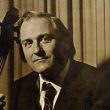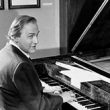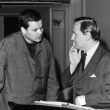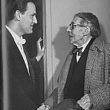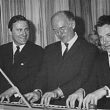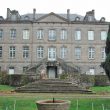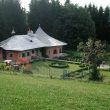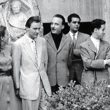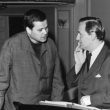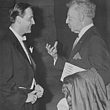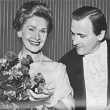Jörg Demus
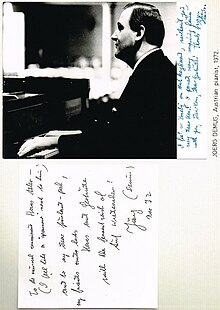
Jörg Demus (2 December 1928 – 16 April 2019) was an Austrian pianist.
Jörg Demus was a highly regarded pianist and one of the finest of accompanists. He was noted for combining a basically Romantic sound and in line with an interest in historic keyboard interpretation and early model pianos.
At the age of six, Demus received his first piano lessons. Five years later, at the age of 11, he entered the Vienna Academy of Music, studying piano and conducting. His debut as a pianist came when he was still a student: at the age of 14, Demus played in the Brahms-Saal for the prestigious Gesellschaft der Musikfreunde. He graduated in 1945, then 17 years old, after which he continued to study conducting with Josef Krips and Hans Swarowsky. Demus studied in Paris with Yves Nat from 1951 to 1953. In 1953 he studied interpretation further with Wilhelm Kempff, Arturo Benedetti Michelangeli, and Edwin Fischer, and attended master classes with Walter Gieseking. In 1956 he won first prize at the Ferruccio Busoni International Piano Competition.
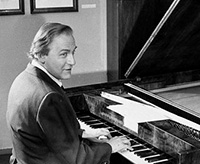
He made his debut as a mature artist in Vienna in 1953. In 1956, he won the Busoni Prize of the International Competition for Pianists. He maintained a notable solo career, especially for personal interpretations of Bach and flexible, colorful renditions of Debussy. He was also well regarded for the main line of German piano music from Mozart to Schumann, and for his performances of the piano music of César Franck. He was a recipient of the Beethoven Ring and the Mozart Medal of Vienna.
He was a sensitive accompanist and worked with singers of the highest caliber, including Elisabeth Schwarzkopf and Dietrich Fischer-Diskau. His version of Schubert’s Winterreise, with Fischer-Dieskau, is perhaps the most critically acclaimed of all recordings of this great song cycle.
He also accompanied violinists (Josef Suk, for instance) and cellists (Antonio Janigro). He sometimes appears in piano duet and two-piano concerts with Paul Badura-Skoda, who shares Demus’ interest in older keyboard instruments. Demus acquired several notable examples of early instruments, including harpsichords and pianos by Broadwood, Clements, and Conrad Graf, and has recorded appropriate music on them. He has also authored several essays, a book on interpretation, and, as co-author with Badura-Skoda, an analysis of the Beethoven piano sonatas.
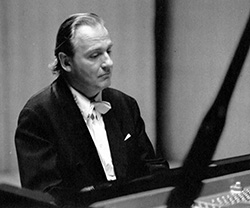
He was active as a Lied accompanist and a chamber music partner, appearing with such singers as Elisabeth Schwarzkopf, Dietrich Fischer-Dieskau, Elly Ameling and Peter Schreier and string players like Josef Suk and Antonio Janigro. He performed widely as a soloist both on modern and on historical instruments and collaborated with Paul Badura-Skoda on the concert platform and in a book on the interpretation of Beethoven’s piano sonatas. In 1972 he toured southern Africa with sold out and acclaimed performances in all the major cities. In 1974, Demus performed for the Peabody Mason Concert series in Boston. Demus played Romantic works quite often: among his recordings are sets of the complete piano works of Schumann; he recorded also the complete piano works of Debussy.
Among his students was the pianist Domenico Piccichè.
Demus was also a composer, chiefly of music for the piano, chamber music and songs, composing in a generally conservative style. Recorded works include Schubert Impromptus on the Deutsche Grammophon label; and a recital of chamber music for cello and piano taking their inspiration from the poems of Paul Verlaine and the later music of Robert Schumann.
He received the Mozart Medal of the Mozartgemeinde Wien in 1979.
He died on 16 April 2019, aged 90.
Jörg Demus was a personal friend of Palace Pianos
We had the Privileged of having him play at many of our Music Festival parties in France.

